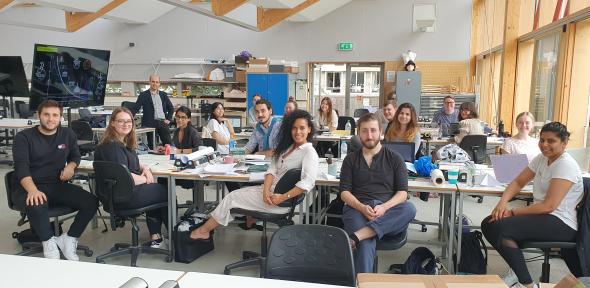Institute of Continuing Education (ICE)

Submitted by Amy Kingham on Wed, 08/12/2021 - 10:25
“An entirely new approach to architectural education”
The University of Cambridge’s pioneering new Part 2 MSt Architecture Apprenticeship has been approved by the Architects Registration Board (ARB).
Cambridge has designed an entirely new and unique course to address the Apprenticeship and to promote fair access to the architecture profession.
The MSt combines intensive fortnight-long residential sessions in Cambridge, where apprentices work in small groups on specialist tasks, with a flexible schedule of offsite study days. Apprentices are assigned a personal supervisor, who ensures their work is on track and demonstrates their personal competence.
The programme is designed with employers in mind. Such flexibility allows them to timetable offsite learning for maximum convenience, without concerns that apprentices will be absent on day release at critical moments.
Professor James Campbell, the Head of the Department of Architecture, said ‘In setting out to design this course, we wanted to create an entirely new approach to architectural education for professionals who want to gain Part 2 and Part 3 while working’. ‘Apprentices get college membership and all the benefits of Cambridge’s University’s research culture. Learning is designed to sit alongside and benefit from their work experience.’
The apprenticeship is administered by the University of Cambridge Institute of Continuing Education (ICE), which is the registered apprenticeship provider for the University of Cambridge.
Dr James Gazzard, the Director of Continuing Education at ICE, said, ‘The Institute of Continuing Education specialises in supporting adults to learn throughout their careers. We share the Department of Architecture’s commitment to evidence-based and work-relevant learning and widening access to the professions. Levy-funded apprenticeships allow us the opportunity to work with employers to develop and diversify their workforces.’
An important aim of the new Part 2 Apprenticeship is developing working relationships between the University and architectural practices at all scales, both nationally and in the East of England region.
Forthcoming intensive residential sessions will be taught by award winning professional practices. Urban design is led by Proctor & Matthews, and sustainable building design by Meredith Bowles of Cambridge based Mole Architects.
The apprenticeship was launched in September 2020 with 17 apprentices, and is now in its second year. It suits highly motivated post-Part 1 assistants.
Those who join in the September following graduation are expected to register as architects in under seven years if they successfully complete all stages on time.
From 2022, apprentices will have use of the Department of Architecture’s spacious and newly fitted out on-site Digital Fabrication workshop.
One of the current students on the MSt Architecture Apprenticeship course, Andrei Macaneata said, ‘I chose to study at ICE because I find that the best way to absorb knowledge is through practice. I felt that it was important to complete my RIBA part 2 and 3 qualifications whilst continuing my career progression in an architecture firm. Even though I am studying part-time and working in London, I still feel like I’m getting the ‘Cambridge experience,’ being a member of Queens' College, taking part in regular college activities and having fortnight residentials spent in Cambridge throughout the year.
The diverse expertise within my cohort makes the course so powerful; we’re all sharing knowledge and learning from one another constantly. Since starting the course, I’ve already noticed that I’ve got increased responsibility at work, enabling me to put my knowledge to the test and bring about a positive impact.’
-----
The Part 2 Apprenticeship course is led by the architect and architectural historian Dr Timothy Brittain-Catlin, author of 'The Edwardians and their Houses', the first radical appraisal of the subject for 40 years. He is a member of Historic England’s national Advisory Committee.